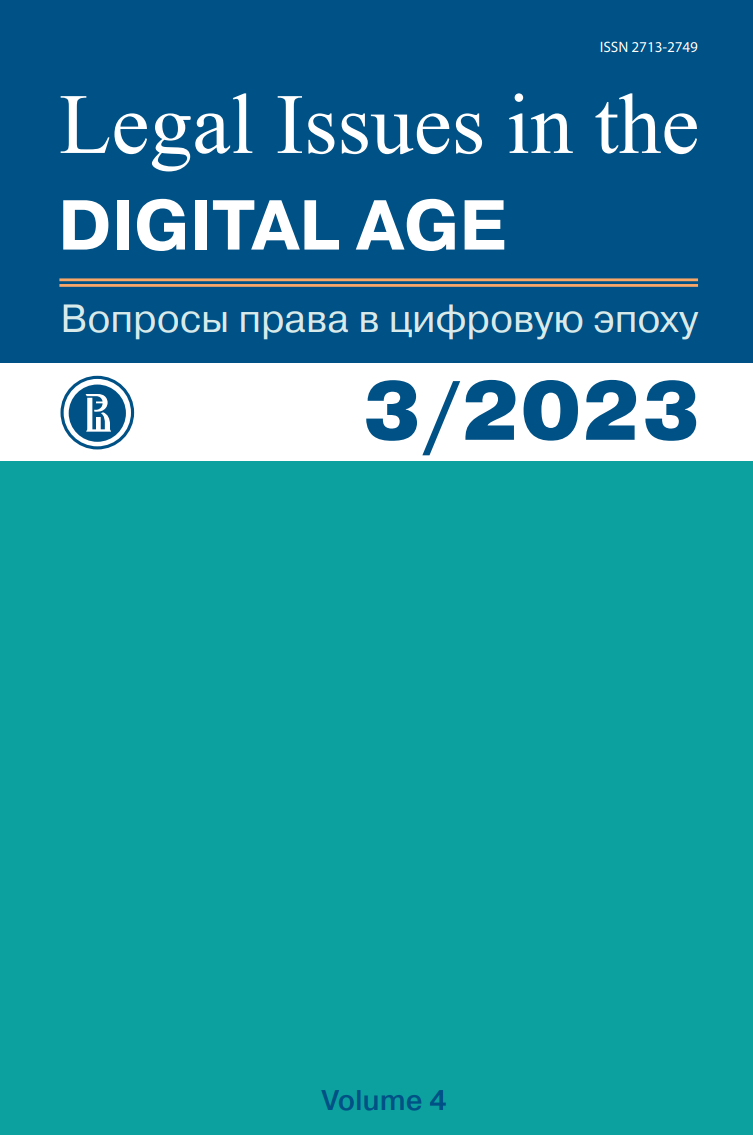Technologies of “Artificial Intelligence”: Problems of Qualification and Legal Regime
Abstract
Based on the civil law methodology, the paper analyzes the concept, legal nature andlegal regime of the technology of artificial intelligence. The subjects discussed include:the civil law doctrine; provisions of the national and international law; enforcementpractices. The study purports to theoretically justify the legal nature and legal regime of“artificial intelligence”. In view of the above subject and purpose, the paper has reliedon the comparative legal and structural system methods as well as simulation method.In particular, the comparative legal method has allowed to explore specific elementsof “artificial intelligence” in the context of the national and international regulationof relevant relationships. The use of this method has also allowed to justify the legalregime applicable to technologies of “artificial intelligence” as intellectual assets. Theuse of the structural system method has allowed to substantiate the legal nature of AIand to identify its structural elements and the scope of application (information andhealth care services; development and use of robotic devices in the oil and gas sector;apartment buildings design etc.). The simulation method has provided an insight intothe correlation between the concepts of “artificial intelligence” and “AI implementationform”, and helped to propose a solution to the issue of legitimacy of sharing theexclusive right to AI. As a methodological peculiarity, the study combines the theoreticaland empirical levels of cognition. The said combination of methods has allowed tolook at the problems of qualification and legal regime in the context of controversialdoctrinal and practical approaches. The study has found that the “artificial intelligence”technology, being a complex technical product, is essentially an intellectual asset(property). It was established that the doctrinal approaches qualifying AI technologiesas a (“digital”) person at law or a physical thing were unfounded. The paper argues infavor of recognizing the exclusive right to the AI technology as an intellectual asset.
References
Afanasiev S.F. (2022) Material and procedural legal personality of artificial intelligence. Vestnik grazhdanskogo protsessa=Bulletin of Civil Process, no. 3, pp. 12–31 (in Russ.)
Aksenova М.А. (2020) The concept of “legal person” in the legal environment. Yurist=Lawyer, no. 7, pp. 18–24 (in Russ.) DOI: https://doi.org/10.18572/1812-3929-2020-7-18-24
Braginsky М.I., Vitriansky V.V. (2005) The contractual law. A textbook. Vol. 2: Property Transfer Agreements. Мoscow: Statut, 840 p. (in Russ.)
Dozortsev V.А. (2005) Intellectual property rights. Concept. System. Codification objectives. Collected articles. Мoscow: Statut, 416 p. (in Russ.)
Dremliuga R.I., Mamychev A. Yu., Dremliuga O.A., Matyuk Yu. S. (2019) Artificial intelligence as a subject of law: pros and cons. Contemporary Dilemmas: Education, Politics and Values, no. 1, p. 12.
Gutnikov О.V., Sinitsyn S.А. (2019) Multiplicity of ownership of the exclusive right: aspects of theory and practice. Zakony Rossii: opyt, analiz, praktika=Russian Laws: Experience, Analysis, Practice, no. 12, pp. 67–73 (in Russ.)
Kartskhia А.А. (2017) Digital imperative: new technologies create a new reality. Avtorskoye pravo i smezhnye prava=Copyright and Adjacent Rights, no. 8, pp. 17–26 (in Russ.)
Kharitonova Yu. S. (2018) Joint exercise of exclusive rights. Pravo i ekonomika=Law and Economy, no. 11, pp. 65–72.
Kuteinikov D.L. et al. (2019) Regulating human interaction with autonomous devices: legal regime discussion. Zakony Rossii=Lex Russica, no. 9, pp. 85– 95 (in Russ.) DOI: https://doi.org/10.17803/1729-5920.2019.154.9.085-095
Lungu Е.V. (2020) Constitutional relationships in light of transition to digital state: regulatory trends. Rossiyskaya justitsiya=Russian Justice, no. 2, pp. 61–63 (in Russ.)
Ponomarev D.V., Barabashev А.G. (2020) Patent protection of research outcomes and artificial intelligence: issues and challenges. Pravo i tsifrovaya ekonomika=Law and Digital Economy, no. 3, pp. 36–43 (in Russ.) DOI: https://doi.org/10.17803/2618-8198-2020-09-3-036-043
Puchkov V.О. (2020) Main aspects of the digital image of person at law in the civil doctrine and practice. Arbitrazhniye spory=Arbitarion Disputes, no. 3, pp. 143–158 (in Russ.)
Scherbak N.V. (2021) An ideal share of the exclusive copyright: utopia or reality? Vestnik grazhdanskogo prava=Bulletin of Civil Law, no. 5, pp. 166–192 (in Russ.) DOI: https://doi.org/10.24031/1992-2043-2021-21-5-166-192
Serova А.V.(2019) Introducing digital technologies into relationships between persons working at a given employer. Rossiyskiy yuridicheskiy journal=Russian Law Journal, no. 5, pp. 65–71 (in Russ.)
Sinitsyn S.А. (2022) Comparative patent law: current issues. Мoscow: Infotropik, 416 p. (in Russ.)
Somenkov S.А. (2019) Artificial intelligence: a thing or a person? Vestnik Moskovskogo Juridicheskogo Universiteta imeni О.Е. Kutafina=Bulletin of Kutafin University, no. 2, pp.75–85 (in Russ.)
Sukhanov Е.А. (2017) Law of things: manual. Мoscow: Statut, 560 p. (in Russ.)
Vavilin Е.V. (2021) How artificial intelligence is transforming civil law and procedural relationships: shaping new legal regimes. Vestnik grazhdanskogo protsessa=Bulletin of Civil Process, no. 6, pp. 13–35 (in Russ.) DOI: https://doi.org/10.24031/2226-0781-2021-11-6-13-35
Vasilevskaya L. Yu. (2021) “Artificial intelligence”: problems of civil regulation. Ekonomika i pravo=Economy and Law, no. 10, pp. 3–16 (in Russ.)
Zenin I.А. (2023) Intellectual Property Law. Available at: Urait e-library. https://urait.ru/library?utm_=&ysclid=ljcuajhygi184594193 (accessed:01.08.2023) (in Russ.)
Authors who publish with this journal agree to the Licensing, Copyright, Open Access and Repository Policy.










